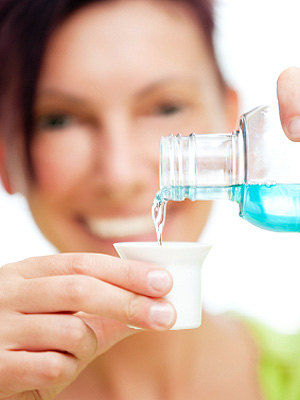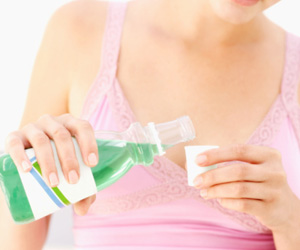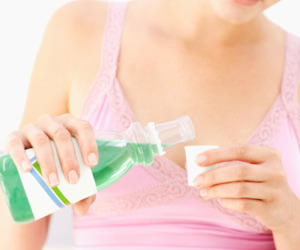We all have our different teeth cleaning routines. Keeping our teeth clean was one of the first things we were taught as a child. Cavities are bad! Bad breath is embarrassing! Your teeth will fall out if you eat too much candy! You’ll have to wear dentures if you don’t brush your teeth! All of these scare tactics are in some way true but can be prevented with some dental care quality time. Some people use electric toothbrushes and some use the old fashion manual ones to keep our dental health in order. We also use tongue scrapers, dental floss, and last but not least mouthwash!
Mouthwash is an important but often skipped step when cleaning the teeth. Brushing is very effective, however rinsing the mouth out not only covers the teeth but the gums as well.
There’s so many different mouthwashes out there, but how do you choose just one? This article will help you be able to narrow it down!
Mouthwash to Freshen Your Breath

Many mouthwashes are available that make your breath smell good, but, they don’t necessarily offer any long-term dental health benefits.
“Cosmetic rinses reduce mouth odors, or halitosis,” Henshaw says. “Some do kill bacteria for a short time, but there is no lasting health impact that you could ascribe to them.” The bacteria killed by these types of mouth rinses will grow back eventually, and while you’ll have fresh and minty breath in the short-term, these rinses don’t actually improve your oral health.
Mouthwash Types 
“There are three major categories [of mouth rinses], from a consumer perspective,” says Michelle Henshaw, DDS, MPH and assistant dean for community partnerships and extramural affairs at Boston University, Henry M. Goldman School of Dental Medicine.
These include mouthwash products that contain fluoride, anti-gingivitis and anti-plaque mouth rinses, and cosmetic mouth rinse products. Some of these mouth rinses are available over-the-counter; others will require a prescription.
Here’s what you should know when shopping for a mouth rinse.
Fluoride-Containing Mouthwashes
Fluoride helps prevent tooth decay by helping your body strengthen enamel. Enamel is the white, harder-than-bone substance that covers teeth. But most people will not require fluoride-containing mouth rinses, says Dr. Henshaw. “You pretty much get that from your fluoridated toothpaste,” she says. But, there are some exceptions.
“People with xerostomia (abnormal dryness of the mouth) might use this kind of mouth rinse, and there are other reasons, like dental caries (cavities),” says Henshaw.Severe dry mouth can lead to a change in the bacterial balance of your mouth, while too much bad bacteria can lead to tooth decay. Fluoride mouth rinses can help prevent these problems.
Check with your dentist if you’re not using fluoride toothpaste. In this case, it might be a good idea to add this into your oral health routine with a fluoride mouthwash.![]()
Anti-Plaque or Anti-Gingivitis Mouthwashes 
![]()
![]()
“For adults, it’s a good idea to include this kind [of mouth rinse] with brushing and flossing,” Henshaw says. Although brushing and flossing are the key components of good oral health, we don’t always do as good a job with these tasks as we should. Anti-plaque and anti-gingivitis mouth rinses can give a boost to your dental care habits by killing potentially damaging bacteria.
“If it has the American Dental Association (ADA) seal of approval that means that the claims made on the bottle have been verified by an independent scientific body,” Henshaw explains. “These rinses work by killing a different spectrum of bacteria than the breath-freshening rinses,” Henshaw says.
Oral bacteria can cause gum disease, so using a rinse that eliminates some of these organisms will help your overall oral health.
For people with more serious oral health concerns, dentists can prescribe stronger mouthwash. “Another level is available by prescription to fight advanced plaque and gingivitis. This will keep inflammation down,” Henshaw says.
Mouthwashes do serve a purpose, whether to freshen your breath or help fight plaque and gingivitis. But, mouthwashes are not a substitute for regular and effective brushing and flossing.
Don’t get lazy with your toothbrush and dental floss. And when choosing a mouth rinse product, pick one that has the ADA seal of approval!
The FDA’s Warning to Mouthwash Makers![]()
![]()
In September 2010, the Food and Drug Administration (FDA) warned a number of mouthwash producers. Some of those including Johnson & Johnson, CVS, and Walgreens. They said that they needed to stop making “unproven” claims in their packaging.
The mouth rinses targeted were mainly those containing sodium fluoride, which has found to be an effective cavity-fighter but ineffective at removing plaque or preventing gum disease.
This reiterates the importance of reading the labels and making sure the necessary ingredients are in the mouthwash and also that they were approved by the FDA!



